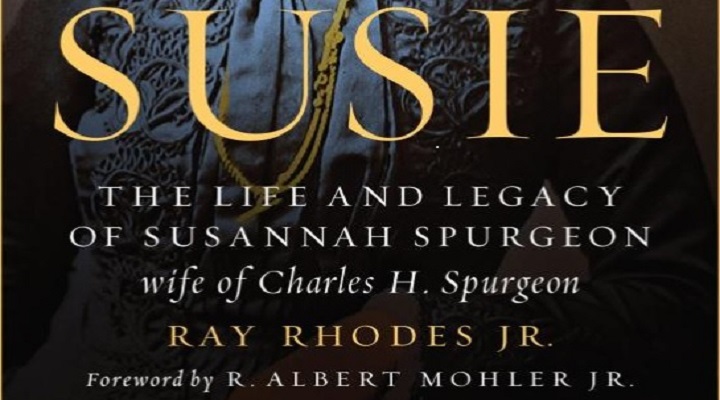Susie:
The Life and Legacy
of Susannah Spurgeon
wife of Charles H. Spurgeon.
Review by Chuck Ivey
Rhodes, Ray Jr, Susie: The Life and Legacy of Susannah Spurgeon. Chicago: Moody Publications, 2018. 294 pp. $19.99
Biographical Sketch of the Author
Ray Rhodes Jr is the founding pastor of Grace Community Church in Dawsonville, Georgia. He is also the president of Nourished in the Word Ministries. His other books include The Marriage Bed and Family Worship for the Christmas Season. The focus of his doctoral thesis was Charles and Susannah Spurgeon’s marriage and spirituality. Pastor Rhodes recently announced that his next book will be Spurgeon in Love.
Introduction
Charles Haddon Spurgeon is easily one of the best-known figures in church history from the last 200 years. The so-called “Prince of Preachers” was powerfully used by God to spread the gospel in England, and his writings have only grown in popularity since his death. We are blessed to have several biographies of Spurgeon himself, but there has been surprisingly little written about his wife, Susannah. Ray Rhodes Jr.’s Susie: The Life and Legacy of Susannah Spurgeon has finally arrived to fill this gap.
Who was Susannah Spurgeon?
Susannah Spurgeon was born Susannah Thompson in 1832. She outlived her famous husband, dying in 1903. “Susie’s” context was Victorian England. She was 5 years old when Queen Victoria was crowned and died 2 years after the Queen’s death (29). During her lifetime, Susie walked alongside Charles through ministry successes and failures, theological controversies. Not only that but she persevered through her husband’s now well-known struggles with gout and depression, in addition to her own personal health problems. The Spurgeons were active in several ministries including founding a pastor’s college, caring for orphans and widows, and producing an incredible amount of solid Christian literature. Susie also personally oversaw a book ministry, providing free resources to needy pastors (139).
Critical Evaluation
I appreciated the way that the author does not paint too rosy of a picture of the Spurgeon’s lives. As I already mentioned, Charles and Susie experienced suffering through several tragedies, theological controversies, and health problems. That being said, Rhodes does not paint too grim of a picture either. It is fair to say that the Spurgeons may not have lived a charmed life, but they certainly had a blessed one. There is a real sweetness to the way that Charles’s courtship of Susie slowly developed from chaste ministerial concern, to special affection, and eventually to a marriage proposal. Susie was converted later in life and Charles gifted her with a copy of his favorite book, Pilgrim’s Progress, to help guide her in her walk with Christ (51).
By the time Charles and Susie were married in 1856, he was already drawing large crowds who wanted to hear him preach. One of the great joys of this book is seeing how much Susie was used by God as the secret weapon in Charles’s ministerial arsenal. As the author puts it, Charles did not just need a wife, “… he needed a very specific wife; he needed Susie Thompson.” (80).
The book includes nice a forward by Albert Mohler, followed by a helpful timeline of Susie’s life. The author then provides an introduction to Susie herself before the 15 chapters which make up the majority of this book. About midway through, the publisher has included some beautiful color photos of various locations, family members, and rare handwritten documents related to Susie’s life. For example, we get to see the ledger entry showing Susannah Spurgeon’s baptism and attendance at the New Park Street Chapel.
I was particularly interested to learn about Susie’s book ministry to poor pastors. The book fund started in 1875 and grew out of Susie’s desire for every pastor to have a copy of Charles’s now famous work, Lectures to My Students (139). Susie told her husband that she thought it was an important work and every pastor should have a copy. Charles suggested that she find a way to make it happen. She took on the challenge and eventually they gave away 200,000 books including works by Spurgeon and others.
The book concludes with an afterward, acknowledgement, and notes. The end notes are really my only criticism of this book and it is a minor one. I would much prefer footnotes over the end notes that are provided. I realize is a personal preference, but if you are someone who likes to actually read the notes it becomes a nuisance to keep flipping back and forth. I seriously doubt publishers who go with end notes are going to stop and it does not detract from the overall content, so I don’t think this is a hill to die on. Again, this is a minor gripe and more of a personal preference.
Conclusion
In Ray Rhodes’ biography of Susannah Spurgeon, he nicely balances scholarly and academic concerns with a more popular level readability. This is a book that I would feel comfortable citing as a resource in seminary. It was obviously very carefully researched and well documented. At the same time, I would have no problem handing it to an average Christian who just wants to read a good Christian biography. Susie: The Life and Legacy of Susannah Spurgeon is highly recommended. It is a must-read for anyone who wants to know more about the woman that God sent to be Charles Spurgeon’s wife and partner in ministry.
A copy of this book was provided by the publisher in exchange for an honest review.





[…] my last article I addressed some of the problems with annihilationism and how it is a departure from the…